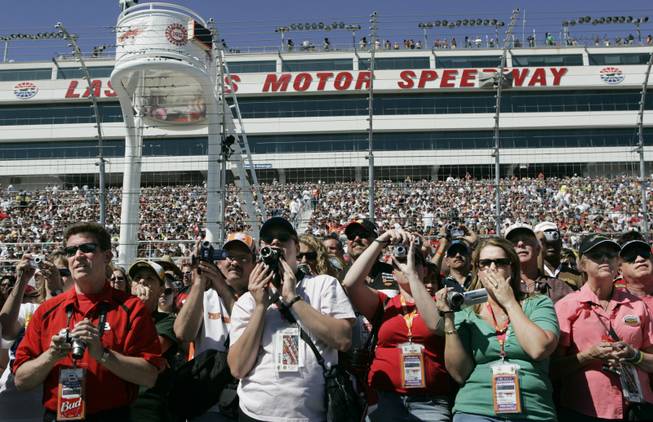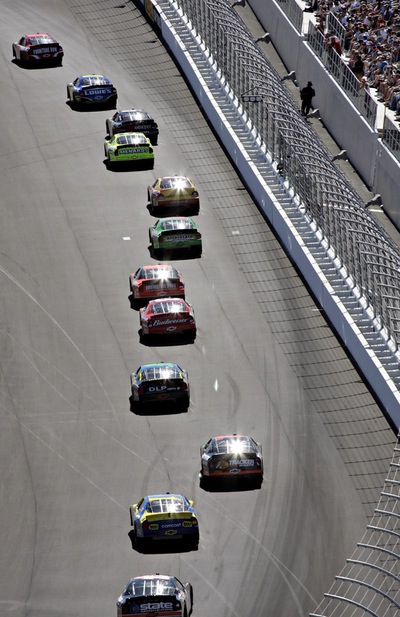
Fans in the sellout crowd at last year’s UAW-DaimlerChrysler 400 in Las Vegas snap photos as drivers are introduced before the Nextel Cup Series race. The race drew 156,000 fans.
Monday, Feb. 25, 2008 | 2 a.m.
Beyond the Sun
Tracks that host two annual NASCAR Sprint Cup Series races
• Atlanta Motor Speedway, Hampton, Ga.
• Bristol Motor Speedway, Bristol, Tenn.
• California Speedway, Fontana, Calif.
• Daytona International Speedway, Daytona Beach, Fla.
• Dover International Speedway, Dover, Del.
• Lowe’s Motor Speedway, Concord, N.C.
• Martinsville Speedway, Martinsville, Va.
• Michigan International Speedway, Brooklyn, Mich.
• New Hampshire Motor Speedway, Loudon, N.H.
• Phoenix International Raceway, Avondale, Ariz.
• Pocono Raceway, Long Pond, Pa.
• Richmond International Raceway, Richmond, Va.
• Talladega Superspeedway, Talladega, Ala.
• Texas Motor Speedway, Fort Worth, Texas
Tracks that host one annual NASCAR Sprint Cup Series race
• Chicagoland Speedway, Joliet, Ill.
• Darlington Raceway, Darlington, S.C.
• Homestead-Miami Speedway, Homestead, Fla.
• Indianapolis Motor Speedway, Indianapolis, Ind.
• Infineon Raceway, Sonoma, Calif.
• Kansas Speedway, Kansas City, Kan.
• Las Vegas Motor Speedway
• Watkins Glen International, Watkins Glen, N.Y.
On a sweltering August day in 1997, a host of dignitaries from NASCAR and Las Vegas gathered on Fremont Street to announce that stock-car racing’s top series — then known as the Winston Cup Series — would race at Las Vegas Motor Speedway beginning the following March.
Although there were plenty of smiles that day, not everyone in the local business community was optimistic that having more than 100,000 NASCAR fans descend on Las Vegas would be as profitable for them as for the year-old speedway.
One of the skeptics was Bill Bennett, who teamed with fellow local casino owner
Ralph Englestad to finance construction of the $200 million speedway.
Bennett, who then owned the Sahara, told the Sun in 1998 that although he was confident landing a Cup race would be lucrative for the speedway, he also knew NASCAR fans had a reputation for not spending money away from the track.
That perception quickly faded when the local casino owners tallied their takes from the inaugural Las Vegas NASCAR weekend.
“I’m out there looking at 130,000 in the stands and I said, ‘There can’t be anybody in the casino,’ ” Bennett, who died in 2002, said in the 1998 interview. “But it turned out to be the biggest weekend we’ve ever had in the casino since I bought this place.”
Last year, NASCAR weekend produced an estimated nongaming economic impact of $133.9 million, according to the Las Vegas Convention and Visitors Bureau. Including gaming, the figure soars to nearly $200 million.
Now, as the speedway prepares for its 11th visit from NASCAR’s premier series this weekend, race, civic and tourism leaders are pondering a tantalizing question: If one NASCAR weekend is that lucrative, would two be twice as profitable for Las Vegas?
The answer is not as simple as just doubling the economic impact of the first race, because even the most fervent NASCAR advocates do not anticipate that a second race would draw as many people or generate as much money, an opinion based on the experience of other two-race tracks. Some, in fact, worry that a second race could undercut the first’s decade-long success.
Most, however, would like to put the pedal to the metal in pushing for a second race.
This year, more than 325,000 fans are expected to attend Sprint Cup Series qualifying Friday, the Nationwide Series (formerly the Busch Series) race Saturday and Sunday’s UAW-Dodge 400 Sprint Cup Series race. Last year, an estimated 156,000 fans attended Sunday’s race.
Every year since North Carolina billionaire Bruton Smith purchased the speedway from Bennett and Englestad for $215 million in December 1998, speedway officials and local leaders have wondered what it would take for NASCAR to grant LVMS a coveted second annual Sprint Cup Series date. NASCAR has been steadfast in saying that it won’t add races to the 36-race schedule to accommodate LVMS, but notes that Smith could move a race date from one of his other tracks. Smith owns seven tracks that host 12 Sprint Cup Series points races.
Smith fueled speculation that LVMS is closer than ever to gaining a second Cup race after he purchased New Hampshire International Speedway and its two Cup races for $340 million late last year. Smith, however, stopped short of saying he would move one of the dates to Las Vegas, although some expect him to announce that Las Vegas will get a second Cup race beginning in 2009 when the NASCAR Sprint Cup Series visits Las Vegas this weekend.
That prospect, however, remains speculative at this point.
“I’m not aware of any reason to believe that anything is imminent on that front,” LVMS General Manager Chris Powell said Wednesday.
Smith, however, has been known to withhold such announcements even from those who run his tracks. In 2006, Smith met with a small group of journalists during a NASCAR test session at LVMS and casually mentioned that he intended to invest $300 million on upgrades at the speedway “over the next few years.” Powell, standing nearby, clearly was caught off guard by the announcement.
“That’s just the way Bruton is,” Powell said.
Others, meanwhile, question whether this is the best time to be thinking about a second race. Although the NASCAR Sprint Cup Series is the most popular form of auto racing in America and is the second most-watched sport in the U.S. behind the National Football League, attendance has tapered off recently at some venues and television ratings have dipped slightly in the past few years.
Even so, Pat Christenson, president of Las Vegas Events, said he believes a second annual race would be a very positive development for Las Vegas.
“Getting a second race and attracting the NASCAR crowd to town is the first and foremost goal,” Christenson said. “That and the (National Finals Rodeo) are the two special events that stick out most in the hotel properties’ minds.”
The local hotel and casino industries relish the notion of a second NASCAR race in Las Vegas.
Alan Feldman, senior vice president of public affairs for MGM-Mirage, said Strip properties are not the only ones that benefit from the NASCAR weekend, which has much the same impact on the community as the annual rodeo.
“Those who are old enough to know what Las Vegas looked like before the rodeo started coming in December will remember that that was a time where there were widespread layoffs and people were taking the month of December off — whether they wanted to or not,” he said.
“Now you can’t get a room here for those couple of weeks. Restaurants are full, the gaming numbers are up and retail business is strong across the board. NASCAR has the same effect.
“As far as we’re concerned, we would love to have a second race, a third race and a fourth race.”
But could the speedway sell out its 140,000-seat facility twice a year?
It wouldn’t have to in order to turn a handsome profit. It is estimated that a well-attended Sprint Cup Series race typically can net a track operator between $20 million and $25 million in ticket sales, concessions and its share of NASCAR’s television contract.
Powell sees no drawbacks to bringing a second Cup race to Las Vegas.
“There’s just so much collateral upside to bringing a big event to our city, I can’t imagine any downside that is worth noting,” he said.
Between 65 and 70 percent of the fans who fill the speedway for its spring race come from outside Clark County and many might not visit Las Vegas twice a year if the speedway were to add another Cup race. Powell, though, said that is not a major concern.
“For every fan that does not want to come back in the fall — if we were to ever have a second race, and there are no guarantees — I think there would be one to take his place who can’t come in the spring,” he said.
Of the 14 tracks across the country that host two Sprint Cup Series races annually, fewer than half routinely sell out both races.
Powell acknowledges that selling out two races would be challenging.
“In any economics class you take, you hear about supply and demand, and if you double supply, then you’re going to be hard-pressed to keep up demand,” Powell said.
“But I’ll tell you this: I think there’s nowhere I’d rather try it more than in Las Vegas.”


Join the Discussion:
Check this out for a full explanation of our conversion to the LiveFyre commenting system and instructions on how to sign up for an account.
Full comments policy